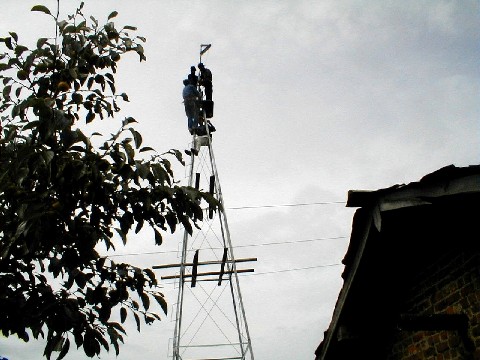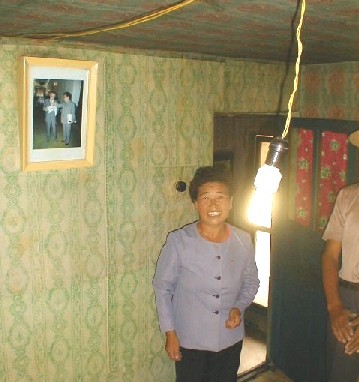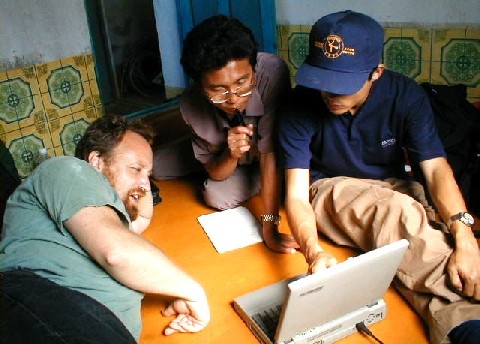Nautilus Concludes Third Renewable Energy Mission to the Democratic People’s Republic of Korea
BEIJING, OCTOBER 3, 2000 — A five-person engineering team from the Nautilus Institute today successfully completed the third mission of the US-DPRK Wind Power Village Humanitarian Energy Project. The mission followed up on two previous trips to North Korea in May and September of 1998.
“We are very pleased by the success of this mission,” said Nautilus Institute Executive Director Peter Hayes, speaking from Beijing. “It brought together our engineers in a close collaboration with the DRPK technicians. They were relying on each other’s skills — standing on a tiny platform forty feet in the air while building the windmill. It’s an excellent way to develop trust and common understanding.
“In this project, we are building peace from bottom up, person by person, windmill by windmill,” he continued. “This kind of bottom-up development project also supports the rapprochement between the two Koreas as well as between the United States and the DPRK.
The Nautilus project, the first of its kind in the DPRK by a U.S.-based non-governmental organization, focuses on rural renewable energy development. On the previous two missions, the Nautilus team worked with North Korean engineers to install seven wind turbines in Unhari, a farming village on the west coast of the DPRK.
The Nautilus Institute is a nonprofit policy development organization based in Berkeley, Calif. It focuses on sustainable development and nuclear disarmament, with a special emphasis on the Asia-Pacific region.
Team Repairs, Adds to Windmills
On Mission 3, which began Sept. 19, the team repaired wind turbines, provided training on their maintenance, and installed a Southern Cross water-pumping windmill to provide drinking water to Unhari village — the first such unit in the DPRK.
“On our previous trips, the villagers were skeptical that we would come back,” Dr. Hayes said. “It was gratifying to see that we’ve now dispelled that skepticism. We have real friends now in North Korea who want us to come back.
“Farmers are practical people,” added Dr. Hayes, who himself grew up on a farm in Australia. “They have no interest in projects that don’t deliver tangible benefits. They genuinely value the wind turbines that light their houses at night, especially in the winter. We are on the right track in the village.”
In addition to Dr. Hayes, the Nautilus team included three engineers who had been on previous missions: chief engineer Mick Sagrillo, a specialist on wind-power technology; Chris Greacen, an expert on rural electrification; and Nautilus Senior Associate David Von Hippel, an expert in energy planning. They were joined by Korea specialist Timothy Savage, Security Program Officer for Northeast Asia, who was on his first trip to the DPRK.
“As someone who has studied Korea for 12 years, I found the opportunity to finally visit the DPRK priceless,” said Savage.
“North Koreans have been told for decades that Americans are their mortal enemies,” he added. “I think that having an American come and speak their own language broke down some of their stereotypes.”
The Nautilus project was planned and carried out in close cooperation with the DPRK-based Korean Anti-Nuclear Peace Committee (KANPC). The DPRK team included engineers from the Non-Conventional Energy Technology Development Center and the Ministry of Electric Power and Coal Industry, as well as local technicians and officials from Unhari village and Onchon County.
“Both Sides Learned a Great Deal”
“Both sides learned a great deal about each other’s engineering practices in the course of Mission 3,” Dr. Hayes remarked. “In particular, the US and DPRK teams were delighted that the joint investigation resolved some urgent technical problems in a scientific and businesslike fashion to our mutual satisfaction.”
The two sides were particularly thankful to the farmers at Unhari and for their active support of this project, he added. He said both sides would continue to work together so that reliable, high quality electric power will flow from the wind system to meet humanitarian end uses at Unhari village.
The Nautilus team also delivered new high-quality, energy-efficient compact fluorescent light bulbs to the people of the village, entering some of the villagers’ homes to present the bulbs directly to the villagers.
Led by Dr. Von Hippel, the team interviewed Unhari residents about their energy uses and the impact of the availability of reliable, quality electric power in their homes.
The Nautilus team also transferred a water purification unit for later installation at a suitable humanitarian site. The unit, manufactured by Water Health International of Berkeley, Calif., uses ultraviolet light to kill pathogens in drinking water.
A recent UN study concluded that contaminated water is a major cause of poor health and malnutrition in the DPRK.
At the conclusion of the tour, Nautilus and KANPC pledged to continue to work together to accomplish their mutual goals. A fourth mission is tentatively planned for next year.




